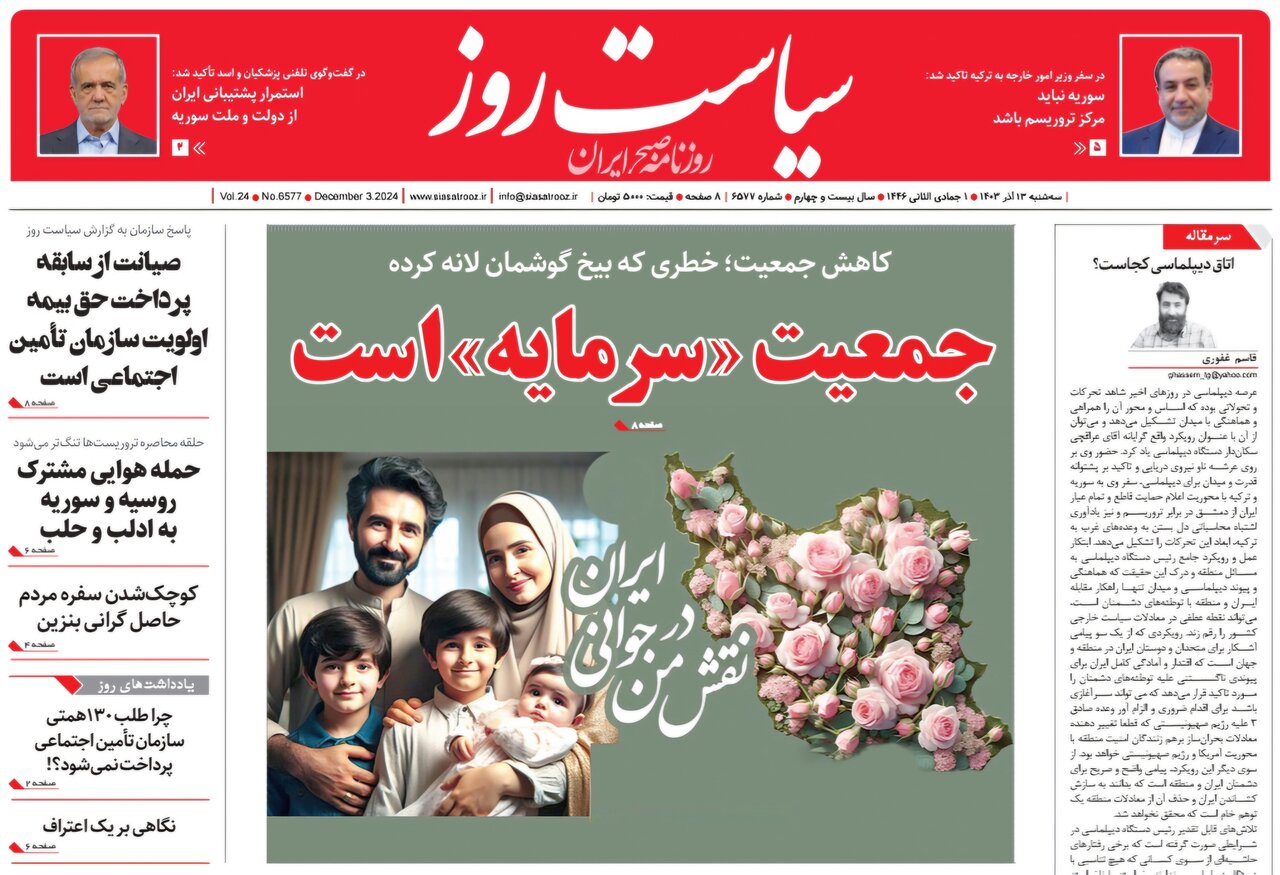Close cooperation between diplomacy and battleground

TEHRAN - Siasat-e-Rooz dedicated its editorial to the strong cooperation between diplomacy and battleground.
It wrote: Foreign Minister Araghchi's pragmatic strategy emphasizes the synergy between diplomatic efforts and military readiness, a trend that has become increasingly evident in recent days. Consequently, the chief diplomat's proactive and holistic stance on regional matters could signify a pivotal shift in the nation's foreign policy. This approach conveys a strong message to Iran's allies and partners both regionally and globally, demonstrating Iran's unwavering authority and preparedness to counteract adversarial schemes. Furthermore, this strategy may herald the anticipated True Promise III initiative against the Zionist regime, which could disrupt the security dynamics orchestrated by the United States and its allies. Adversaries must recognize that the notion of excluding Iran from regional affairs is a mere fantasy that will not materialize.
Javan: Negotiations with Europe do not promise a clear prospect
Javan highlighted the unclear nature of Iran's negotiations with European nations in a recent note. It stated that following the United States exit from the JCPOA, the European parties have yet to define their position in the discussions with Iran. They remain uncertain about their strategy in light of the forthcoming American administration's policies. Factors that can put Tehran's future talks with Paris, London, and Berlin in ambiguous conditions. The approach of the incoming Trump government is an issue that both the Iranian and the European sides still cannot make a clear assessment of. The European troika hopes that Washington will adopt a policy of applying pressure with a slight change of approach towards engagement. Of course, Iran works with all parties that respect its national interests, because it considers each of them to have a potential capacity. But Tehran should play an effective role in Trump's policy. According to Foreign Minister Araghchi's statements, the Europeans have taken a confrontational approach and we should not be optimistic about the Geneva negotiations.
Vatan-e-Emrooz: Key role of Iran, Syria, and Iraq in the East-West corridor
In a recent commentary, Vatan-e-Emrooz discussed the motivations behind the activities of terrorists in Syria and the subsequent decline in regional security. The publication noted that Iran, Syria, and Iraq play a crucial role in the East-West corridor, which facilitates access to Europe. Iran's efforts in realizing the achievements of East-West transit by protecting the security of this route will secure Iran's future in China's "Belt and Road Initiative". In opposition to this plan, the U.S. is trying to prevent the full realization of this project and Iran's achievement of its commercial goals by making strategic corridors insecure. Transit connection to the Mediterranean is one of the most important regional policies of Iran. The establishment of such connectivity, which mitigates the impact of sanctions, is likely to diminish America's influence in West Asia. Consequently, the United States and its allies are employing various strategies, including military action and fostering instability, to thwart this objective. The development of the East-West corridor will position Iran as a significant transit center in the region, enabling it to effectively contribute to international trade and transportation.
Donya-e-Eqtesad: Is Geneva talks a prelude to negotiations with Trump?
Today, the question is whether the new round of talks between Iran and European countries in Geneva is a prelude to negotiations with Washington. There are various perspectives on this matter. Some argue that these discussions could serve as a platform for negotiations between Iran and the United States. Conversely, another faction contends that the Europeans are pursuing their agenda, emphasizing the significance of this process concerning the activation of the trigger mechanism, which would reinstate UN sanctions on Iran. Given that Trump exited the JCPOA in 2018 and the Europeans have struggled to uphold the agreement independently, likely, they cannot move forward with activating the trigger mechanism without U.S. backing. Today, Trump wants Iran not to have nuclear weapons. In such a situation, perhaps Trump's words can be interpreted in a way that if negotiations are held with the United States, Washington will want to extend the sunset clause to make the International Atomic Energy Agency's monitoring of Iran's nuclear programs permanent. Now, it is not possible to answer until Trump starts his work because Trump's terms and conditions for direct negotiations with Iran are not clear.
